人類学研究所国際化推進事業 活動一覧
《国際化推進事業》国際公開シンポジウム「Wisdom for Living with Natural Disasters-Initiatives of Local Residents in Response to Changes in their Societyー」
2019年10月05日
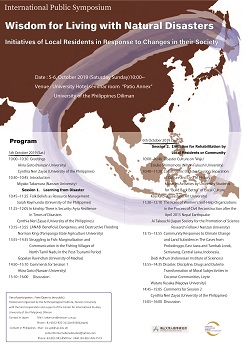 |
(10月1日)会場が変更となりました。
Date : 5-6, October 2019 (Saturday Sunday)
Venue : University Hotel seminar room "Patio Annex", University of the Philippines Diliman
Time : 10:00~
Fee of Participation : Free (Open to the public)
Hosted and organized by the Anthropological Institute, Nanzan University with the kind cooperation and support of the University of the Philippines
2019/10/5
10:00~10:30 Greeting, Akira Goto, Cynthia Zayas
10:30~10:45 Introduction, Miyako Takamura
*-*-* Session 1 *-*-* Learning from Disaster
10:45~11:25 "Folk Beliefs as Resource Management "
Sarah Raymundo (Center for International Studies, University of the Philippines)
11:25~12:05 "In kinship There is Security: Ayta Resilience in Times of Disasters"
Cynthia Zayas (Center for International Studies, University of the Philippines)
13:15~13:55 "LANAB Beneficial, Dangerous, and Destructive Fooding"
Norman King (Pamapanga Agricultural State College)
13:55~14:35 "Struggling to Fish:Marginalization and Communication in the Fishing Villages of North Tamil Nadu in the Post-Tsunami Period"
Gopalan Ravindran (University of Madras)
14:50~15:10 Comments
Akira Goto (Anthropological Institute, Nanzan University)
15:10~16:00 Discussion
2019/10/6
*-*-* Session 2 *-*-* Initiative for Rehabilitation by Local Residents or community
10:00~10:40 "Disaster Culture on 'Waju' "
Etsuko Shimomoto (Nihon Fukushi University)
10:40~11:20 "Catastrophic Disaster Causing Separation of Culture and Loss of History:Museum Activities by University Students for "Build Back Better" of Local Culture"
Koji Kato (Musashino Art University)
11:30~12:10 "The Roles of Women's Self-Help Organizations in the Process of Civil Reconstruction after the April 2015 Nepal Earthquake"
Ai Takeuchi (Research Fellowship for Young Scientists of Japan Society for the Promotion of Science/Nanzan University)
13:15~13:55 "Community Responses to Climate Change and Land Subsidence:The Cases from Probolinggo, East Jawa and Tambak Lorok, Semarang, Central Jawa, Indonesia"
Dedi Adhuri (Indonesian Institute of Sciences)
13:55~14:35 "Disaster, Discipline, Drugs and Duterte:Transformation of Moral Subjectivities in Coconut Communities, Leyte"
Wataru Kusaka (Nagoya University)
14:45~15:05 Comments
Cynthia Zayas (Center for International Studies, University of the Philippines)
15:05~16:00 Discussion
【Summary】
This Symposium will discuss how local residents will re-establish their lives by their own wisdom after the disaster according to Anthropological Point of View.
Natural disasters may vary according to seasons, weather, and topographical features of the area. Therefore, these typhoons and floods can easily be predicted according to time scale and period when and where it occurred, unlike earthquake, tsunami or volcano eruptions which is hard to predict even these modern era.
On the other hand, when natural disaster occurred, our life and economic societies are at risk. But we human beings are living "before, after, between" disaster from long time ago, and always make a way to survive after disasters. Human beings were not only protecting their lives but also finding a way to re-establish their lives' back after each disaster. Therefore, human beings have been creating the wisdom to live and survive after disaster based on their environment long time ago.
On the other side, modern society is developing science, people tried to control nature. For example; In Tohoku Japan after Great East Japan Earthquake 3.11, seawalls have been planned to be built with unreachable height on the coast. Seawalls can help reducing damage from tsunami, but at the same time it may result negative effects for peoples who are making a living in sea areas, mostly fishermen. Therefore, this strategy gives big concerns to the government.
Until now, there are gaps between the rehabilitation supports of natural disasters or the disaster prevention program by the government /administration and people's right of making a living from those areas. But on the other hand people are using wisdom living with nature for own initiatives and survival skills that they learned from experiences after disasters long time ago.
At this symposium, through the presentation of cases from Japan, Philippines, Indonesia, India etc. we will discuss what kind of Initiatives and survival skills local people are doing to re-establish their lives back after disaster occurred.
【要 旨】
本シンポジウムは、「自然災害とともに生きるための叡智」という視点から、自然災害発生後、地元住民が叡智をどのように駆使して暮らしの再建を取り組んできたのか/いるのか、人類学の立場から検討する。
自然災害は、気候・季節・地形により異なり、襲来の時間・規模の予測が比較的容易な台風や洪水、発生の予想が困難で数年から数百年に一度という期間で発生する大地震・大津波、火山噴火などがあり、その災害規模も様々である。
他方、災害が起きた際、私たちは災害によって社会・経済を含む暮らし全体に断絶が生じたと強調しがちである。しかし、より巨視的な捉え方をするなら、人類は常に自然災害発生の「前・後・間」を生きてきたことがわかるだろう。そのなかで人類は、自然災害から身を守るだけでなく、いかに暮らしを再建するのかという問題と向き合ってきたといえる。つまり、人類は自らが暮らす地域の環境の特徴に合わせて、自然災害とともに生きるための叡智を長い年月の中で形成してきたのである。
一方、近代社会は科学を発展させ、人間は科学知に基づいて、自然を管理・制御・征服すべきであるとの考えを浸透させてきた。たとえば、日本の東北地方では、3.11東日本大震災の津波被害を教訓に、想定される最大限の波の高さ以上の防波堤を海岸に建設する計画が進められている。防波堤建設は津波被害の軽減に一定の効果をもたらすが、海とともに生きてきた現地の人々の生活や生業に多大な影響を及ぼす現状もあり、行政内でも困惑をもたらす政策である。
このように、国家や行政を主体とした自然災害の復興支援・防災プログラムと、現地に暮らしつづけてきた住民が望む復興支援や防災のあり方との間には、ズレが生じがちである。一方、このようなズレが生じる中で、地元住民は暮らしを再建するため、これまで培ってきた自然と共に生きる知恵を駆使しながら、自ら取り組みを行っている。本シンポジウムでは、日本、フィリピン、インドネシア、インド等のアジアの事例を通し、自然災害による社会変化に対し、地元住民がどのような取り組みを実践しているのかを問う。
【報告】
公開国際シンポジウムを南山大学人類学研究所主催、インターナショナルスタディーズセンター・フィリピン大学ディリマンの協力の元、フィリピン大学ディリマンで10月5日と6日の2日間で開催しました。
フィリピン、インドネシア、インド、ネパール、日本の事例を通して、自然災害発生後の復興の取り組み、特に被災地住民による取り組みに焦点をあて、外部組織との関わりについて議論しました。
フィリピンの事例においては、ピナトゥボ火山噴火後の人々の取り組みと政府との関係性、および2004年におこった津波の影響によるココヤシ栽培継承の断念によって引きおこったレイテ島の人々の暮らしの変化について報告がありました。インドネシアの事例においては、気象変化と地盤沈下に関する住民の新しい技術適応について報告がありました。インドの事例においては、2004年に起こった津波による人災ともいえる被害に対する漁民の苦悩について報告がありました。ネパールの事例においては、2015年に起きた大地震への女性組織の取り組みについて報告がありました。日本の事例においては、地域の叡智である輪中文化と住民かつ政府との関係性、および2011年の東日本大震災の復興に対する地元住民の取り組みについての報告がありました。
シンポジウムの前半は、被災地では、政府や自治体との間にどのようなことが起こっているのかを議論しました。後半は、被災地における住民の取り組みの実践が具体的に紹介され、被害者による取り組み、自治体、政府との関係性を議論しました。
シンポジウム終了後の10月7日には、ルソン島パンパンガ・ピナトゥボ火山噴火被災地への視察をおこないました。
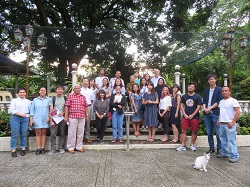 |
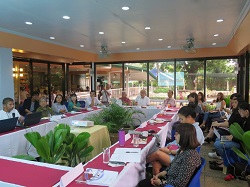 |
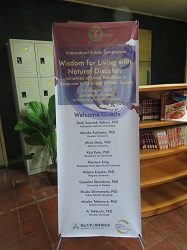 |
| シンポジウム全参加者 | シンポジウムの様子 | ウェルカムポスター |
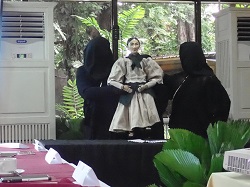 |
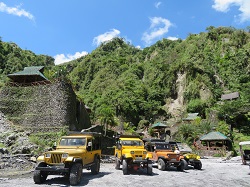 |
|
|
フィリピン大学生による文楽の披露 |
韓国によってリゾート開発された |